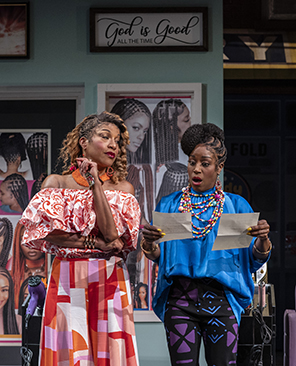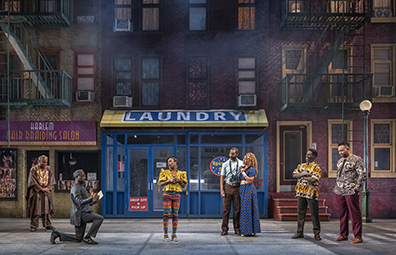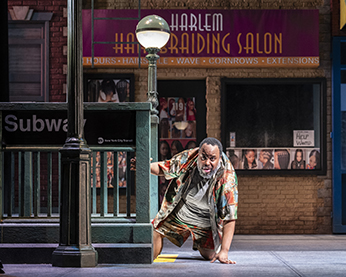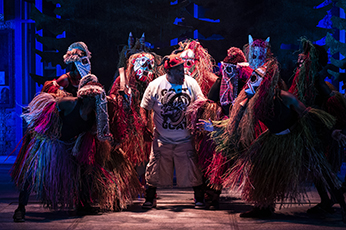Merry Wives
Today's Merry Wives and a Timeless Falstaff
Shakespeare Theatre Company, Harman Hall, Washington, D.C.
Thursday, September 11, 2025, D-111 (center front stalls);
Friday, September 12, 2025, N-23 (far left second-level stalls)
Adapted by Jocelyn Bioh
Directed by Taylor Reynolds

Madam Ekua Page (Oneika Phillips, left) and Madam Nkechi Ford (Felicia Curry) compare the love letters—identical except their names—that Johnny Falstaff sent them in Merry Wives, Jocelyn Bioh's adaptation of William Shakespeare's The Merry Wives of Winter at the Shakespeare Theatre Company's Harman Hall in Washington, D.C. Photo by Teresa Castracane.
It plays like the premiere of a new reality series franchise. Merry Wives (of Harlem) stars Anne Page, Johnny Falstaff, and the merry wives, Madam Nkechi Ford and Madam Ekue Page, streaming now at the Shakespeare Theatre Company's Harman Hall in Washington, D.C.
Sounds ridiculous? So is the play it's built on, William Shakespeare's The Merry Wive's of Windsor. As adaptations of Shakespeare’s works go, Jocelyn Bioh’s is one of the most thoroughly Shakespearean transfers to the 21st century I've seen of any of the Bard’s 16th century plays. For one thing, much of the script is Shakespeare’s text with unoriginal portions judiciously chosen and craftily woven into the original's rhythms. For another, Shakespeare’s great comic creation, Sir John Falstaff, gets a thoroughly modern rendition in the performance of Jacob Ming-Trent. Originating the role in the play's 2021 Public Theatre premiere in New York, Ming-Trent was a late replacement during rehearsals for this production and destined to be one of the most indelible Falstaff's romping through my memories to the end of my time on this earth.
In a Taylor Reynolds-helmed production set in an immigrant West African community full of music, dance-filled living, and overly impassioned characters—all on an authentically replicated New York City neighborhood street—this two-hour (no intermission), pure-fun presentation is a brilliant approach to Shakespeare’s “written-in-two-weeks” nonsense fluff. You want a laugh meter measure? On a scale of four, I give it a solid four: I laughed from start to finish through a preview performance, again through the following night's opening night, and again and again while transcribing my notes for each performance. Oh, wait: make that a five score: I laughed while writing this review, too (actually, 5.5, as I'm editing it now).
Reynolds presents Merry Wives in the spirit of the Real Housewives television franchise. The primary characters first appear in their own spotlight moment, showing off their sass and brass, then slip into Shakespearean character. Madam Ford (Felicia Curry) and Madam Page (Oneika Phillips) are constantly playing for the invisible cameras, even when alone or doing mundane things like getting their hair done at the Harlem Hair Braiding Salon or doing laundry in the Speedy Suds laundromat.
Bioh wrote the 2023 Broadway hit Jaja's African Hair Braiding, which received five Tony nominations, and won a special Tony for Hair and Wig Design by Nikiya Mathis, who does the hair and wigs for Merry Wives. Perhaps not surprisingly, a major portion of the Lawrence E. Moten III-designed set is the Harlem Hair Braiding Salon offering "4 hours-Hairstyle-Wave-Cornrows-Extensions" and a job opportunity based on the "Help Wanted" sign in the window. Madams Ford and Page compare their identical love letters from Falstaff in this salon, the third or fourth production of The Merry Wives of Windsor I've seen in which that scene is played in a hair salon.
Next door is the Speedy Suds Laundry, where you can get “Wash & Fold,” “Drop Off & Pick Up,” and “Same Day Service.” This business is owned by the Fords, where a large laundry basket is available to cart away Falstaff in his first escape from Mister Nduka Ford (Nick Rashad Burroughs). Above the businesses are air-conditioned tenements, some windows lit by lamps, some by ceiling lights, and metal fire escapes descending down the walls. This is 116th Street in Harlem, with globe-topped green lamppost to one side and a New York Subway station on the other. Sometimes sunshine bathes the neighborhood, other times streetlights cast spotlights against encroaching nighttime in Jeanette Oi-Suk Yew's deft lighting design. The salon and laundromat open up and move forward for interior scenes, Falstaff’s apartment interior (with album covers on the wall) floats down from the catwalks while the Caius Medical Office rises through the stage trap door. I've often criticized Shakespeare Theatre Company's overreliance on overly elaborate sets, but Moten's detailed street scene is exactly right for the reality television feel of this production while authenticating the musically fueled joy-of-living essence permeating this Harlem community (sound design and composition by Mikaal Sulaiman).
The production invites us to share in this essence from the start. Ensemble member Shaka Zu takes hold of a conga drum next to the subway entrance and starts playing, claps twice, and points at the audience. A couple people clap twice. Zu gives us a disappointed look, plays again, claps twice, points, and we clap twice. More conga playing, pointing, and double claps follow as the street comes alive with the characters dancing as they go about their business (choreography by Ashleigh King), dressed in brightly colorful West African American stylings by costume designer Ivania Stack. In the middle of the party, Anne Page (Peyton Rowe) and Fenton (Latoya Edwards playing Fenton as a woman) meet and circle each other in a spotlight.

116th Street in Harlem, New York, created by scenic designer Lawrence E. Moten III, is the setting for the Shakespeare Theatre Company's production of Merry Wives, Jocelyn Bioh's adaptation of William Shakespeare's The Merry Wives of Windsor at Harman Hall in Washington, D.C. From left: Shallow (Craig Wallace), Mister Ford (Nick Rashad Burroughs) kneeling for forgiveness from his wife, Madam Ford (Felicia Curry), Mister and Madam Page (JaBen Early and Oneika Phillips), Pastor Evans (Sekou Laidlow) and Dr. Caius (Jordan Barbour). Photo by Teresa Castracane
Having established the mood, Reynolds establishes the thematic framework. Mister Kwame Page (JaBen Early) greets Pastor Evans (Sekou Laidlow), Shallow (Tyrone Stanley, understudy for Craig Wallace), and Slender (Bru Aju) and then announces, "Here's my daughter, Ann Page." Rowe enters dancing, poses in a spotlight provocatively, then slips immediately into a shy teen’s demeanor. Page announces to Shallow that Falstaff is in his house, and Falstaff gets his star entrance, emerging onto the Pages' stoop like a rapper with choreographed hands dancing into an arms-crossed, ultimate cool pose. Page announces to everybody (including the audience), “Here's the Merry Wives!" Curry and Phillips strut in together, do some dance steps, and pose to the applause. You expect to see their names appear in their tableau somewhere under their big-smile visages.
Phillips and Curry deliver centerpiece performances of emotional and physical overacting, capturing the heightened supposedly non-acting of reality television performances. I hope that comes off as a compliment because that’s how it's meant; I'm wondering how exhausted their bodies must feel after a two-show day. Meanwhile, they are bringing much emotional depth to their characters.
Phillips’s Madam Page shifts from her playful performing persona to serious business when she encounters her daughter, Anne, with Fenton. Madam Page wants Anne to marry Doctor Caius (Jordan Barbour as a not-very-closeted gay man), but she clearly doesn’t approve her own daughter’s obvious lesbian leanings. "I will not be your friend nor enemy,” Madam Page tells Fenton. “My daughter will I question how she loves you, and as I find her, so am I affected. Till then farewell.” As Anne tarries, her mother tells Fenton more urgently, “She must needs go in; Her father will be angry.” In this reading, I see Madam Page displaying an attitude of acceptance on matters of gender identity while using the threat of her husband’s angry attitude as a veil for her own attitude to avoid the subject.
Yes, Early's Mister Page is adamant that he will have none of Fenton. “You wrong me thus still to haunt my house,” he says to Fenton. “She is no match for you. … Knowing my mind, you wrong me.” While this comes across as homophobic, Page already has established that, like his wife, his desire is to have Anne marry a man of his choosing, though his choice is the foolish but wealthy Slender, whom Aju portrays as diligently working up feelings for Anne per the instructions of his uncle Shallow and Pastor Evans. Money is Page's ethical foundation, and in the play's final scene, upon learning of Anne's and Fenton's elopement, Page is the first to warmly welcome his new daughter-in-law to the family as the sensible thing to do.
Whether in Bioh’s adaptation or Reynolds’s direction, this production cleverly emphasizes the solid foundations of the married couples at the play’s center by portraying each individual as mirror images of their spouse. The Pages are both sturdy, go-with-the-flow personalities, reflected in Phillips's and Early's steady line readings, flowing physical gestures, and shared attitudes toward each other. The Fords being two nerves-wracked personalities who mutually distrust each other’s motives, Curry and Burroughs deliver similarly over-the-top antic performances. Again, this is meant as a compliment. Ford is one of Shakespeare’s great comic creations who happens to share a play with Shakespeare’s greatest comic creation. An actor who effectively captures Ford’s comically misguided insecurities can steal the show, and Burroughs would have with most other Falstaffs I've seen. He takes on a Rastafarian persona in his disguise as Brook, straining to contain his natural tendencies to yelp, squeal, and convulse in agitated bewilderment. As the similarly high-strung Madam Ford, Curry’s facial expressions get as much of a workout as her arms, legs, and hips do in her performance’s astounding comic physicality.
Rowe’s Anne Page is a force. In her opening sequence with Slender she shifts from pleasant hospitality to barely patient hostility, and in the final scene she steals Fenton’s thunder in their confrontation with her parents. Edwards's presentation of Fenton heightens a subtext in Shakespeare’s play: Fenton not only is the best personality match for Anne, he or she also more than lives up to the money motives behind the parents’ choices. It is Fenton who showers Anne with gifts and bestows payments to go-between Mistress Quickly—or, in this community, Mama Quickly. Played by a plucky Kelli Blackwell, Mama Quickly is the Caius Medical Office receptionist, and her speech on all the chores she does for her employer start with Shakespeare’s descriptions but shift to doctor’s office tasks, from cleaning and making beds to checking in patients and checking them out. Bioh makes a more interesting shift in the character of Pistol (also played by Aju). He’s a street con with a casual attitude as long as he gets paid. In a plot departure from Shakespeare's play, Bioh has no inn as a setting so she provides no host as a character; Pistol thus becomes Fenton’s assistant with her plans to elope with Anne. Fenton naturally pays him up front, but he, moved by her sincerity, gives back her money as a wedding gift. Nice touch.


Top, a soaked Falstaff (Jacob Ming-Trent) emerges from the New York Subway station after his misadventures in a Speedy Suds Laundry basket in the Shakespeare Theatre Company's production of Merry Wives, Jocelyn Bioh's adaptation of William Shakespeare's The Merry Wives of Windsor at Harman Hall in Washington, D.C. Above, Falstaff wearing Chicago Bulls antlers, is bewitched by voodoo fairies in this immigrant West African community's take on Shakespeare's play-climaxing masque. What sets Ming-Trent’s performance apart from the gallery of Falstaffs I've seen in the Henry IV plays and Merry Wives is how thoroughly current he makes this iconic, 16th century comic character. Photos by Teresa Castracane.
At last—but certainly not least—let’s talk Falstaff. This adaptation illustrates Shakespeare’s time-traveling skills as a writer: his fat, disgraced, blowhard of a Medieval-era, Renaissance-created, English knight easily fits into 21st century American culture. Ming-Trent’s portrayal is astounding from the start. Gregarious, self-centered, full of misaligned confidence, displaying outdated cultural sensibilities (if not lacking sensibilities altogether), Ming-Trent's Falstaff ultimately is somehow an endearing guy we know so well: he’s one of my colleagues, he was my boss on one of my temp gigs, and I've seen him at many baseball games.
And he’s hilarious, whether he’s speaking Shakespeare’s lines, Bioh’s lines, or Ming-Trent’s lines; it’s sometimes hard to discern the true source of what comes out of this Falstaff's mouth, which is the genius of the Shakespeare/Bioh/Ming-Trent creative triumvirate. After his laundry basket journey and dumping into the river (I’ll let you imagine which river, this being Harlem), Ming-Trent’s soaked Falstaff crawls out from the subway station complaining about the trick played on him. “You may know by my size that I have a kind of alacrity in sinking,” he says, speaking Shakespeare's line to the audience, earning an audience-wide laugh. “Oh! You think that’s funny?” Ming-Trent responds angrily.
Falstaff has a lot of soliloquys in this play, and even when he’s talking to Quickly or Pistol or Ford/Brook he’s performing for himself, perfectly fitting the thematic aesthete of Bioh’s adaptation. It’s only natural for Falstaff to shatter the fourth wall and get down with the theater audience. “You all having a good time?” he yells after emerging from the audience at one side of the stage following the merry wives punishing him with their second prank.
“Yes!” replies most of the audience.
“I want to hear you say ‘Hell yeah!’” Ming-Trent says cupping his ear.
“Hell yeah!” yells the entire audience.
“Are you all having a good time?” he repeats.
“Hell yeah!” the audience yells.
“Well I’m not!” Ming-Trent yells back.
The courting scenes involving Falstaff and Madam Ford are as chaotic as you can imagine—actually more so—between the hyperactive wife and the hyper self-imagined ultra-Romeo. In their first assignation, Falstaff enters the laundromat singing his opening lines, proving himself quite the vox albeit very much over-affected. “I'm gonna make you my woman!” Ming-Trent’s Falstaff sings. “Me, your woman?” Curry’s Madam Ford responds with a combination of playacting anticipation and true-life fright. Falstaff has arrived carrying a teddy bear holding a heart. “A gift for me?” Madam Ford asks. “You deserve it!" an overexcited Falstaff replies and throws the bear at Madam Ford hitting her right on the face. Intended? I hope so—it happened both nights, and her reaction earned a big laugh. Upon Madam Page arriving and Falstaff hiding, the two wives mimic the enhanced emotions of Telemundo soaps in carrying out their prank (which, admittedly, is not much more exaggerated than their normal behavior).
Given Shakespeare’s masterful creation, almost every version I’ve seen of the Henry IV and Merry Wives Falstaffs could be considered definitive. What sets Ming-Trent’s performance apart from the rest is how casually current he makes this iconic, 16th century comic character. Bioh's adaptation also makes the wives' pranks on Falstaff fitting for 2025 Harlem. Instead of an old woman in the second interrupted assignation, they disguise Falstaff as an older man than he is. That may be allowing for modern sensibilities, but it also allows Ming-Trent's Falstaff to comment that he’s been made to look “like an old, black Dumbledore.” As for the antlered Herne scene that ends the play, the setting makes it realistic via the pageant presented as a West African voodoo dance ceremony and Falstaff wearing a Chicago Bull’s baseball cap with long horns sticking out the side.
Falstaff is also the centerpiece of the production’s highlight comic moment, though he did nothing to earn the sustained, minutes-long laughter and exit applause. That honor belongs to Rebecca Celeste as Nafi, an assistant in the Fords’ business who, by herself, laboriously pushes the Speedy Suds-logoed laundry basket bearing the sheet-covered Falstaff past a puzzled Mister Ford and his astonished friends and out of the laundromat. It’s a six-century-old gag that never fails, but I dare say I’ve never seen it succeed so well as this 21st century version.
Eric Minton
September 24, 2025
Comment: e-mail editorial@shakespeareances.com.
Start a discussion in the Bardroom



 Find additional Shakespeareances
Find additional Shakespeareances